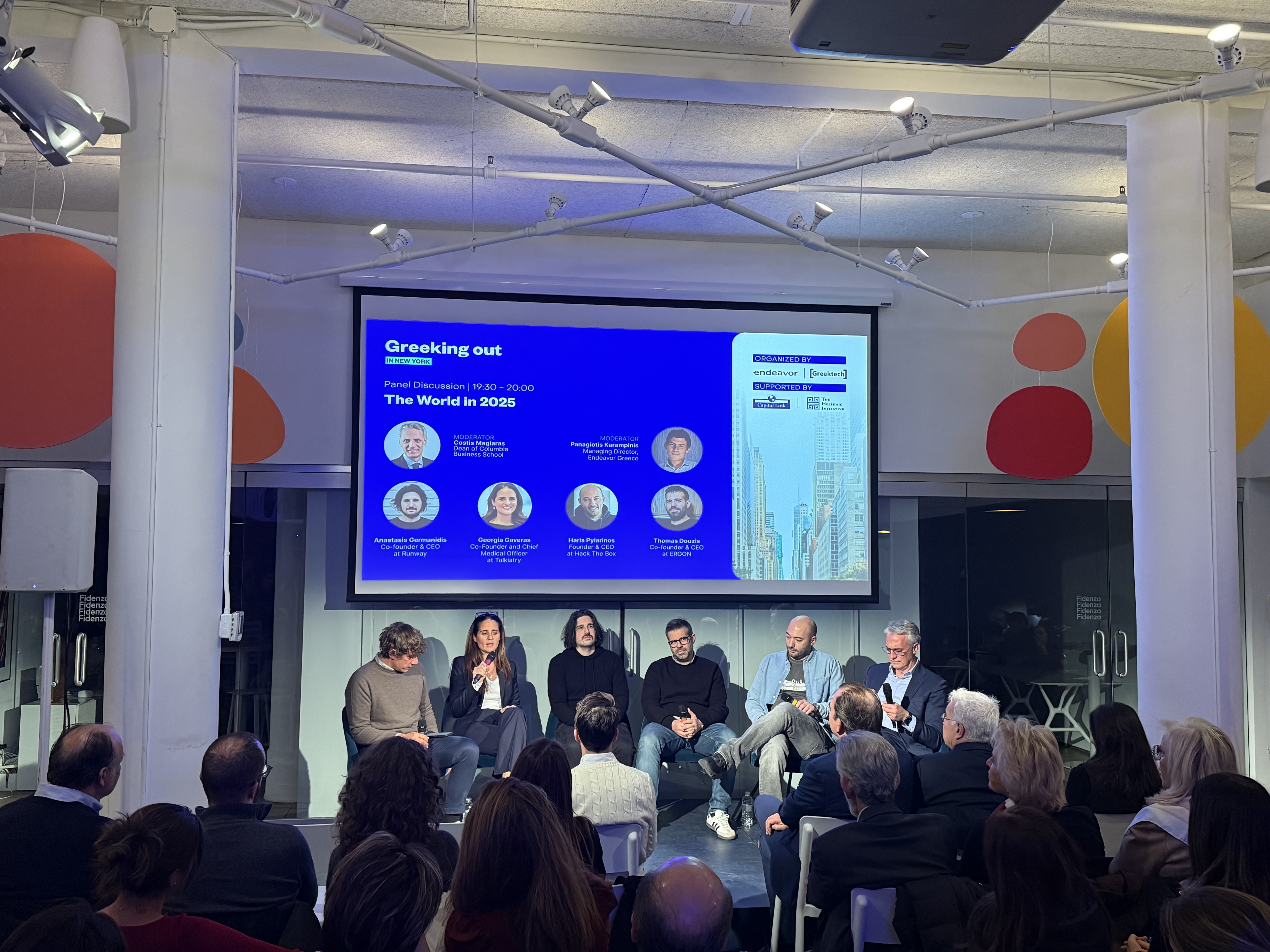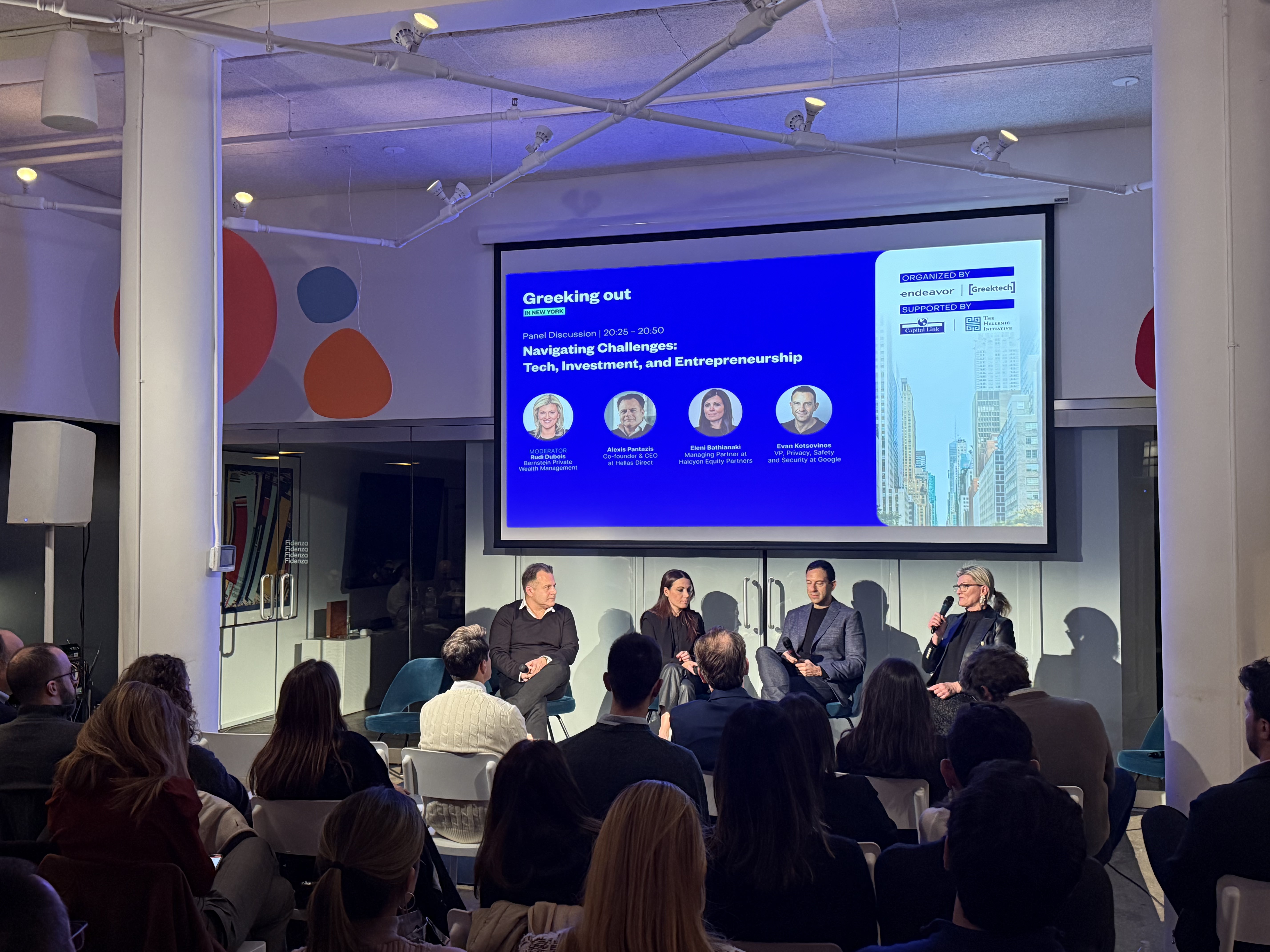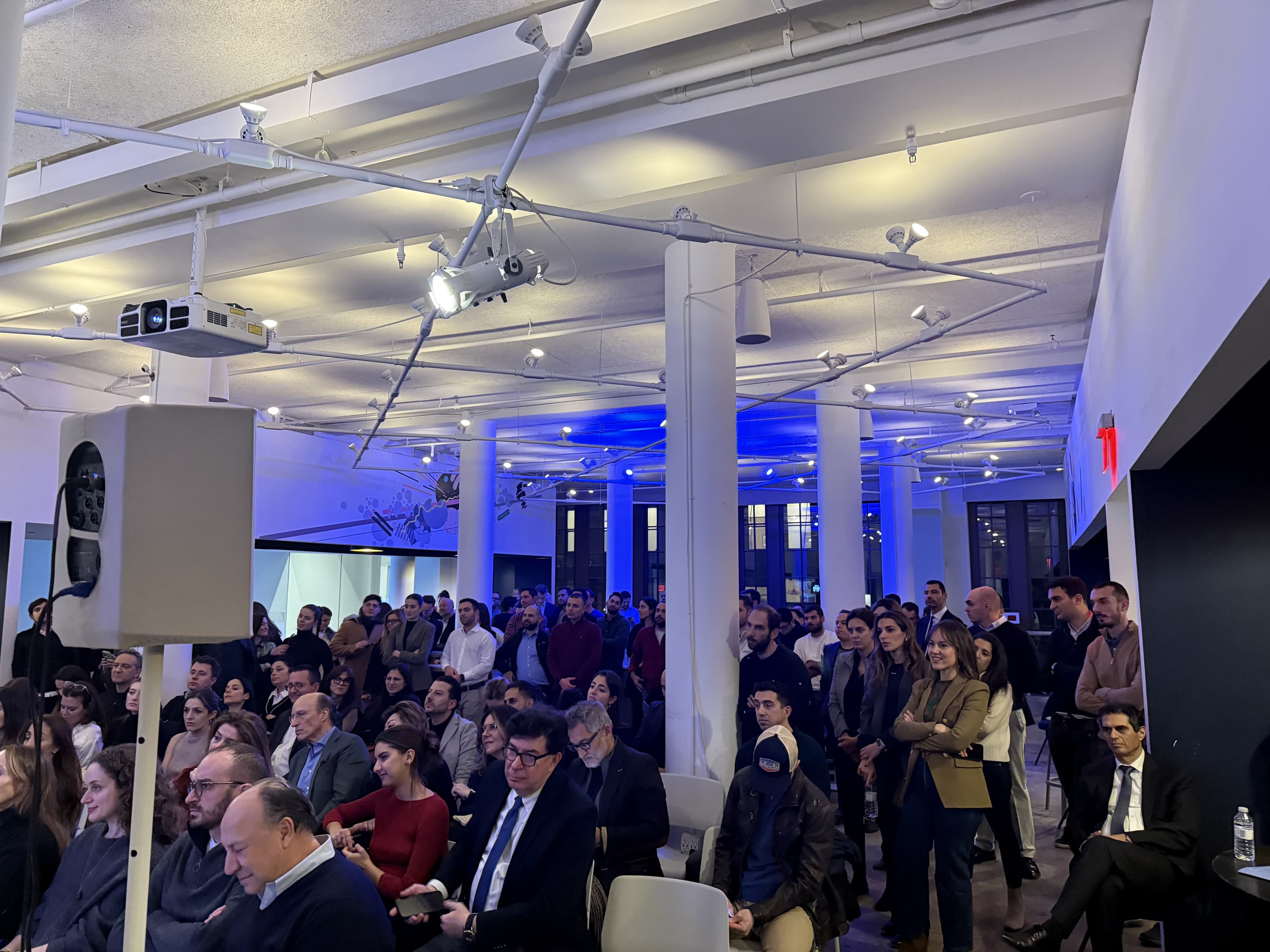3rd Greeking Out in New York: The Pitfalls and Promise of 2025
By Endeavor Greece Dec 19, 2024
In 2024, Greek-founded startups raised over $1.3 billion, saw 11 exits, and added another company to the growing list of Greek unicorns — Blueground. But entrepreneurial success isn’t just about impressive numbers. It’s about impact.
As Michael Printzos, Greece Country Head of The Hellenic Initiative put it: “Entrepreneurship is about creating real change for the society at large. It's about creating jobs. It's about creating role models.”
To catalyze this kind of big change, the Greek innovation ecosystem relies not just on Greek entrepreneurs, but Greeks abroad too. That’s why every year Endeavor Greece hosts a series of “Greeking Out” events in tech hubs like Singapore, London, San Francisco, and just this month, New York.
These events are dedicated to building bridges between Greece and the vital community of diaspora Greeks building, investing, and advancing technology around the world. Our aim is to highlight the ties that connect Greece and the world and create opportunities for further synergies.
Our 3rd Greeking Out in New York brought together Greeks and Greek Americans doing path-breaking work in technology and startups. Over the course of three panels, top founders and investors from the Endeavor Greece network (Endeavor Entrepreneurs and ScaleUppers) and Greek diaspora discussed what they are excited and worried about in the coming year, as well as sharing their best advice for the community in the year to come.

Reasons for optimism
When it came to both the opportunities and challenges companies are likely to face in 2025, artificial intelligence came up again and again.
Anastasis Germanidis, co-founder and CTO of AI video generation startup Runway, was keen to highlight the new artistic possibilities opened up by advances in AI.
“The history of art and technology have always been intertwined, so new art forms emerged through new technologies. Generative AI is no different,” he explained. In the coming years Germanidis expects AI to speed the work creators are currently doing, but also allow new kinds of stories to be told.
“What happens when you empower individuals to make films with a similar amount of resources as it takes to write a novel? What kind of stories will be told that are not currently being told?” he asked, predicting new, more interactive forms of storytelling as AI models mature.
Georgia Gaveras, co-founder of online psychiatry startup Talkiatry, is also excited about AI driven efficiencies. The medical field is just beginning to experiment with the possibilities, but Gaveras stresses “when you leave the room, your doctor has a ton of work left.” AI may soon take much of those tasks off the plates of medical professionals.
Bill Gianoukos, founder of virtual medical clinic Goodpath, agreed: “In healthcare, we know that we can leverage AI to make the entire process more efficient.”
Even in security, where AI poses huge new challenges (more on that below), it is also set to be a powerful tool for the good guys. “A couple of months ago, we had the first instance where we had an AI agent that was able to find a software vulnerability in a real piece of software that's widely used out there on the internet,” reported Evan Kotsovinos, a VP at Google focused on security.
But AI advances aren’t the only thing making the founders hopeful. “My grandparents, even my parents or Gen X, my generation, we didn't talk about mental health. What's really exciting to me is that people are actually realizing that mental health is health,” Gaveras noted. “Somebody that doesn't take care of their mental health has poorer outcomes period.”
Panel co-moderator and Dean of Columbia Business School Costis Maglaras offered another reason for optimism: a new center his university opened in Athens. “The thing that we know how to do is how to promote entrepreneurship within the university system and then take IP out of universities to start companies. That's something that would do well here in the United States and we don't do as well in Greece, and that's an opportunity where we can collaborate,” he said.
Panos Adamopoulos, founder of Seismos, echoes Maglaras’ excitement about the Greek startup scene. “I left Greece like 15 years ago. I don't remember such a vibrant community of people, scientists, innovators, and entrepreneurs,” he observed.

Points of caution
While AI shows great promise, it also creates big new risks. Few are better placed to understand them than Haris Pylarinos, co-founder and CEO of cybersecurity training startup Hack The Box.
“71% of all breaches start with an unaware employee. That's still the number one problem with all those technologies,” Pylarinos explained. AI magnifies the challenge of human error.
“Let's say you send an email in your organization that you need to log in — very generic — but statistically, if you send that email to 10,000 employees, 1% will reply. With AI, you have the ability to customize the message per individual and you could also have the ability to live chat with 10,000 employees simultaneously. AI will befriend you and it'll fool you. So the statistic from 1% in 10,000 employees, maybe grows to 10%,” he warned. Hack the Box is working to mitigate these risks by providing live training to counter them.
For Thomas Douzis, co-founder of food and lifestyle brand ERGON, the technology that has him worried isn’t AI, but social media. “The thing that scares me most is how fast things, trends, and lifestyles are changing. Hundreds of restaurants are opening and they're closing very fast now because the trend is changing so fast. You just go inside the restaurant, take a video, post it in TikTok, that's it. You will never go to this restaurant again,” he said. “The difficult thing is to be there after a year or two and not be the TikTok trend.”

Advice for 2025
Looking at this landscape full of pitfalls and promise, what advice did the panelists have to share? Many stressed the importance of focusing on mission to aid recruiting and resilience.
“We are privileged because our mission statement is to improve quality of life and it's really easy to retain talent when that's your mission statement,” stressed Gianoukos of Goodpath. To keep this mission front and center for employees, Goodpath created a Slack channel sharing customer feedback. “All our employees, if they're having a tough day, they literally just go into that Slack channel. Seeing how big of an impact we have on people's lives allows us to have a great culture in our office,” he explained.
Similarly, Dafni Bechtsi, founder and CEO of Cinobo, said that mission helps her arthouse film platform against behemoths like Netflix. “The vision to make great cinema really accessible and to solve this problem that we all had has been a reason to attract talent and has been a reason to stay resilient in harder times,” she agreed.
Other panelists focused on fundraising, with Gianoukos warning founders against raising too much: “Be very diligent with how much you raise. It has to be the right number. There's some fixation with big numbers. It's as if people think that if a CEO has raised a hundred million, it's two times better than if a CEO has raised 50 million. But maybe it's the opposite.”
Meanwhile, Hellas Direct co-founder Alexis Pantazis stressed the importance of finding investors aligned with your vision. “In the beginning we had to beg whoever would give us money,” he said of his time raising money during the height of the Greek crisis. “In hindsight I would've been a little bit more aggressive when it didn't feel right to have an investor on board not to accept the money.”
Eleni Bathianaki of Greek private equity growth fund Halcyon Equity Partners, highlighted just how far the fundraising landscape in Greece has evolved since Pantazis was scraping together the money to start Hellas Direct. Back then many investors couldn’t see a future in Greece, but now “this has changed a lot,” she said. “We've seen a number of global, international, big investors investing in the country.”
With a stable government, a vibrant tech scene, and increasing access to funds, 2025 is looking like it might be even brighter for the Greek innovation ecosystem if founders can take advantage of the opportunities and avoid the pitfalls highlighted by the panelists.
